

The European Financial Review » Management New » Winning with Risk Management: Focus on Operational Risks. By Russell Walker Operational risk in financial service firms is largely self-inflicted and the losses mainly preventable.
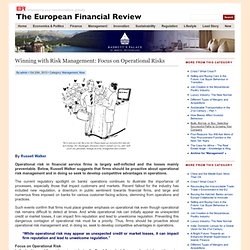
Below, Russell Walker suggests that firms should be proactive about operational risk management and in doing so seek to develop competitive advantages in operations. The current regulatory spotlight on banks’ operations continues to illustrate the importance of processes, especially those that impact customers and markets. Recent fallout for the industry has included new regulation, a downturn in public sentiment towards financial firms, and large and numerous fines imposed on banks for various customer-facing actions, stemming from operations and practices. The European Financial Review » Economics & Politics Finance Innovation Lifestyle Management New » Risk Intelligence for Personal Wealth: Thinking Beyond the Balance Sheet. Feature By Sherilyn Casiano Risk intelligence is as vital for the future of individual personal wealth as it is for any business.
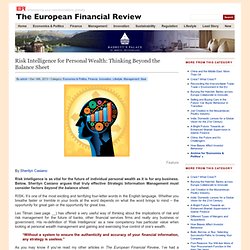
Below, Sherilyn Casiano argues that truly effective Strategic Information Management must consider factors beyond the balance sheet. RISK. It’s one of the most exciting and terrifying four-letter words in the English language. Leo Tilman (see page __) has offered a very useful way of thinking about the implications of risk and risk management for the future of banks, other financial services firms and really any business or government. “Without a system to ensure the authenticity and accuracy of your financial information, any strategy is useless.”
As you may know if you’ve read my other articles in The European Financial Review, I’ve had a passion, ever since I was young, for what I call Strategic Information Management. The same is true in business and personal finance. Open2Europe : Les 10 commandements de la Gestion Globale des Risques. Open2Europe tous les communiqués Services aux entreprises.
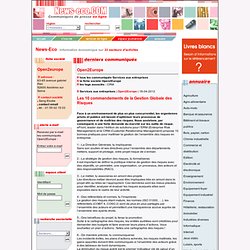
Risk management must not be event-driven. Enterprise risk management (ERM) must not be driven by events, as this approach usually does not result in an organisation getting the desired results.
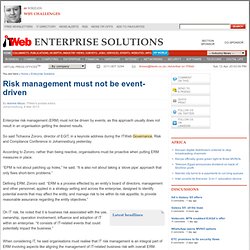
So said Tichaona Zororo, director of EGIT, in a keynote address during the ITWeb Governance, Risk and Compliance Conference in Johannesburg yesterday. According to Zororo, rather than being reactive, organisations must be proactive when putting ERM measures in place. “EPM is not about patching up holes,” he said. “It is also not about taking a ‘stove pipe’ approach that only fixes short-term problems.” La voix des employés reste une valeur importante dans la gestion de l'e-réputation. Les employés en tant que créateurs actifs de contenus sur les réseaux sociaux impactent la e-réputation de l'entreprise.
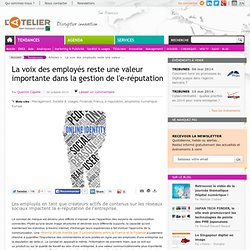
Le concept de marque est devenu plus difficile à imposer avec l'apparition des moyens de communication connectés. Plutôt qu'une seule image structurée et déclinée sous différents supports, la capacité qu'ont maintenant les individus, à travers Internet, d'échanger leurs expériences a fait évoluer l'approche de la communication. Une récente étude menée par 3 universitaires entre la France et la Finlande a justement cherché à quantifier l'importance des commentaires et avis postés en ligne par les employés d'une entreprise sur la réputation de celle-ci. Le constat en apparaît le même, l'information de première main, que ce soit sur un produit ou sur la qualité de travail au sein d'une entreprise, à une valeur communicationnelle plus importante sur la réputation de ceux-ci.
Réévaluer le rapport à la réputation Le bien-être de l'employé mis en avant. ERM: Old concept, new ideas - Network World. Enterprise risk management (ERM) is hardly new.
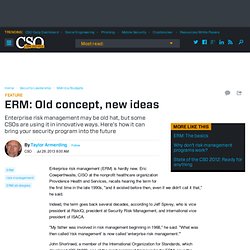
Eric Cowperthwaite, CISO at the nonprofit healthcare organization Providence Health and Services, recalls hearing the term for the first time in the late 1990s, "and it existed before then, even if we didn't call it that," he said. Indeed, the term goes back several decades, according to Jeff Spivey, who is vice president at RiskIQ, president at Security Risk Management, and international vice president of ISACA. ACE Study: Reputation the Hardest Risk to Manage. Ninety-two percent of companies believe that reputational risk is the most challenging category of risk to manage, according to a major new study from ACE Group conducted across 15 countries within its EMEA (Europe, Middle East and Africa) region.
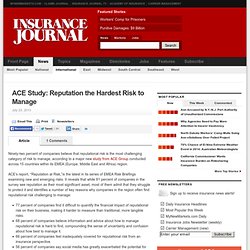
ACE’s report, “Reputation at Risk,”is the latest in its series of EMEA Risk Briefings examining new and emerging risks. It reveals that while 81 percent of companies in the survey see reputation as their most significant asset, most of them admit that they struggle to protect it and identifies a number of key reasons why companies in the region often find reputational risk challenging to manage: The report also proposes a number of solutions to adopt, including: Rebranding Your Risk Management Identity. As risk managers look to define their role within an organization, they may find that the answers they are looking for lie in enterprise risk management.
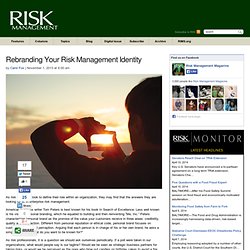
American business writer Tom Peters is best known for his book In Search of Excellence. Less well known is his view on personal branding, which he equated to building and then reinventing “Me, Inc.” Peters characterizes personal brand as the promise of the value your customers receive in three areas: credibility, quality and satisfaction. Different from personal reputation or ethical code, personal brand focuses on customer delivery and perception. Arguing that each person is in charge of his or her own brand, he asks a simple question: “What do you want to be known for?” Risk Status Rising. After years of being branded as company naysayers, risk managers are rising in rank and esteem.
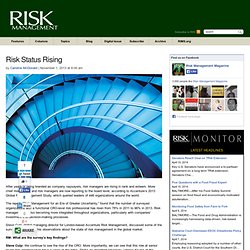
More chief risk officers and risk managers are now reporting to the board level, according to Accenture’s 2013 Global Risk Management Study, which queried leaders of 446 organizations around the world. The report, “Risk Management for an Era of Greater Uncertainty,” found that the number of surveyed organizations with a functional CRO-level risk professional has risen from 78% in 2011 to 96% in 2013. Risk management is also becoming more integrated throughout organizations, particularly with companies’ investment and decision-making processes. Steve Culp, global managing director for London-based Accenture Risk Management, discussed some of the survey’s findings and his observations about the state of risk management in the global market. RM: What are the survey’s key findings? Steve Culp: We continue to see the rise of the CRO.